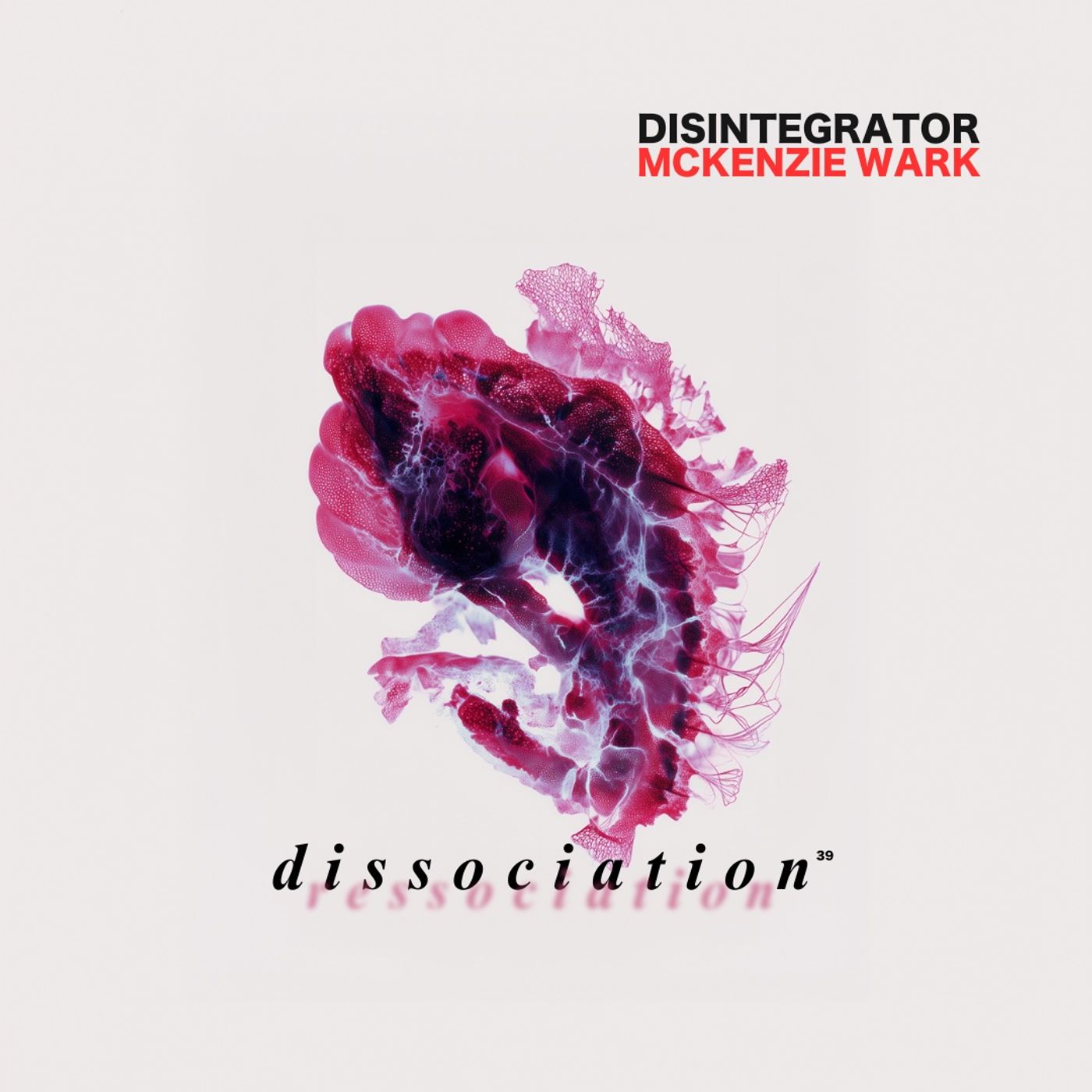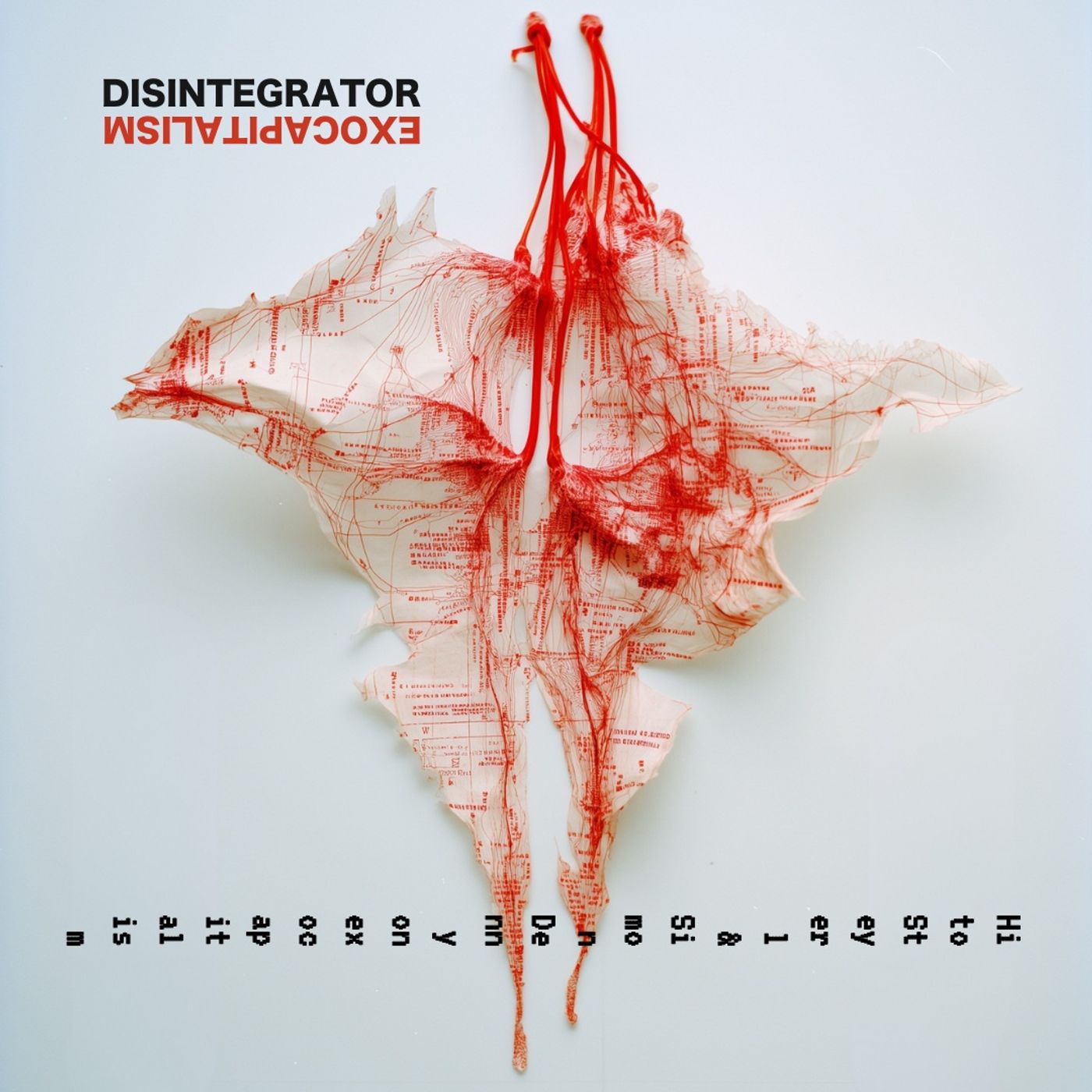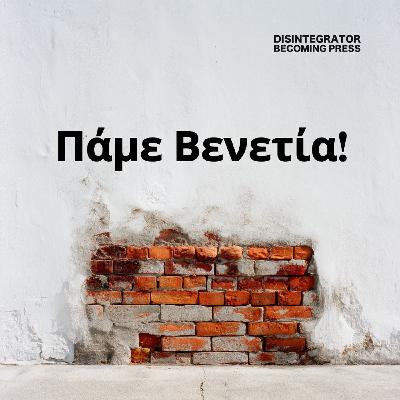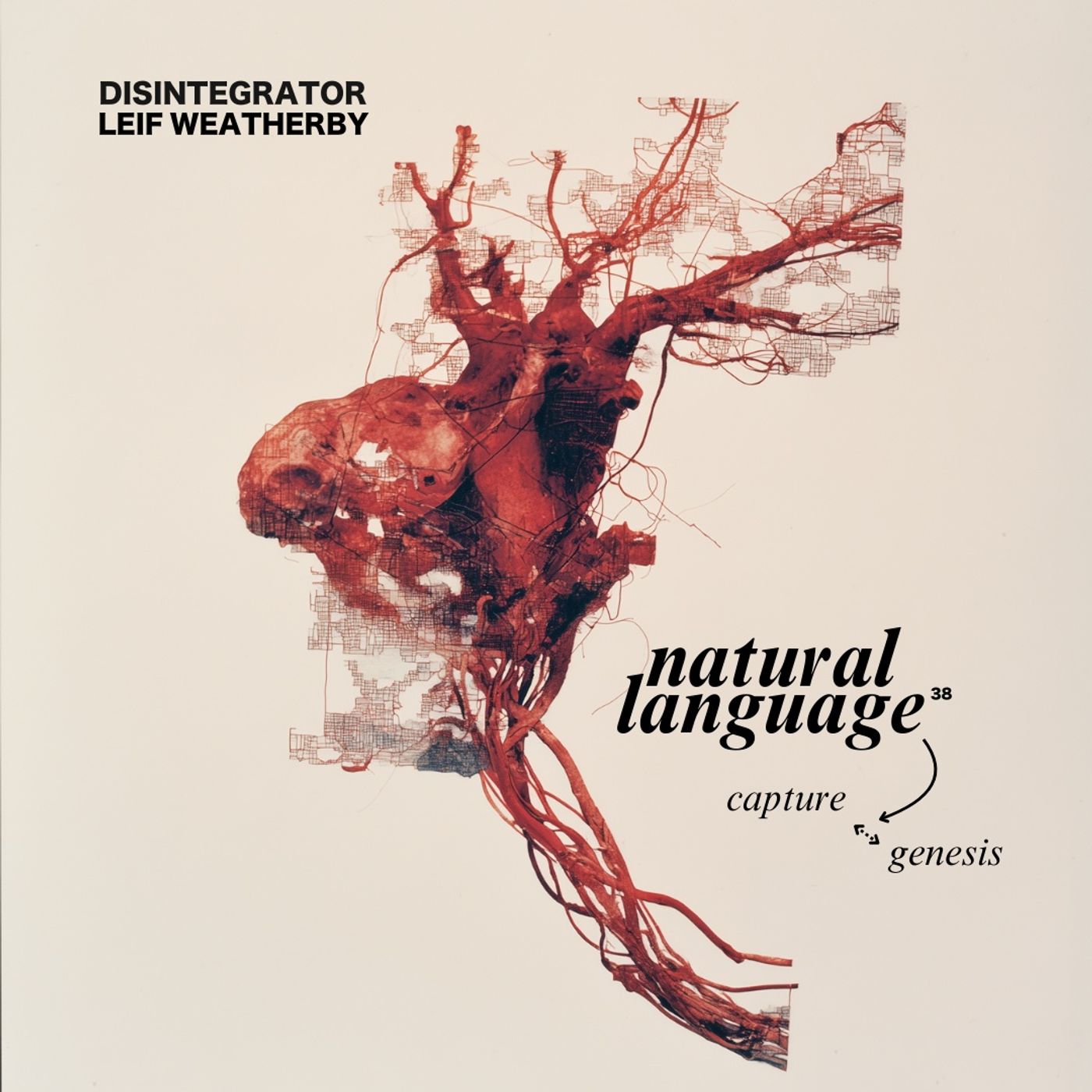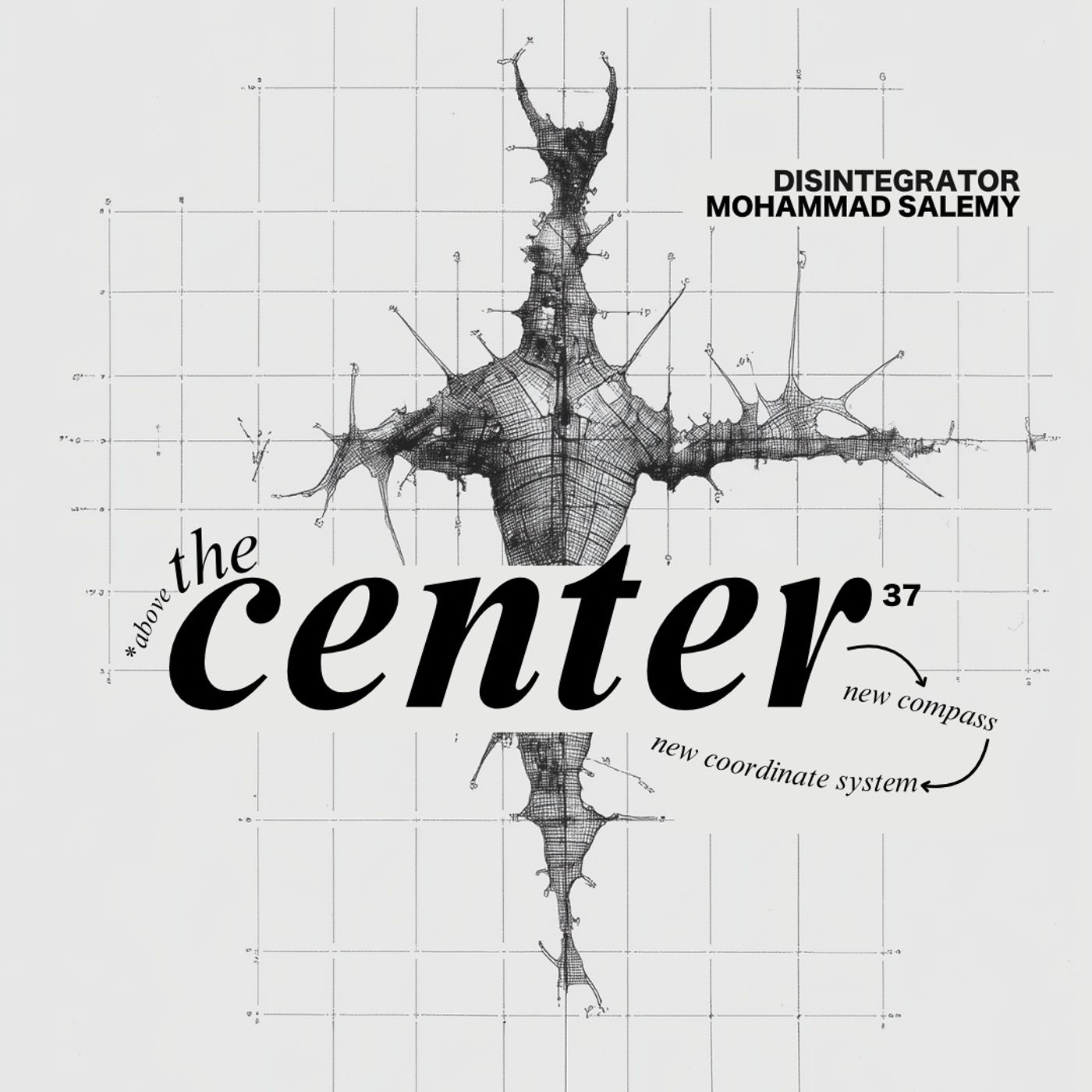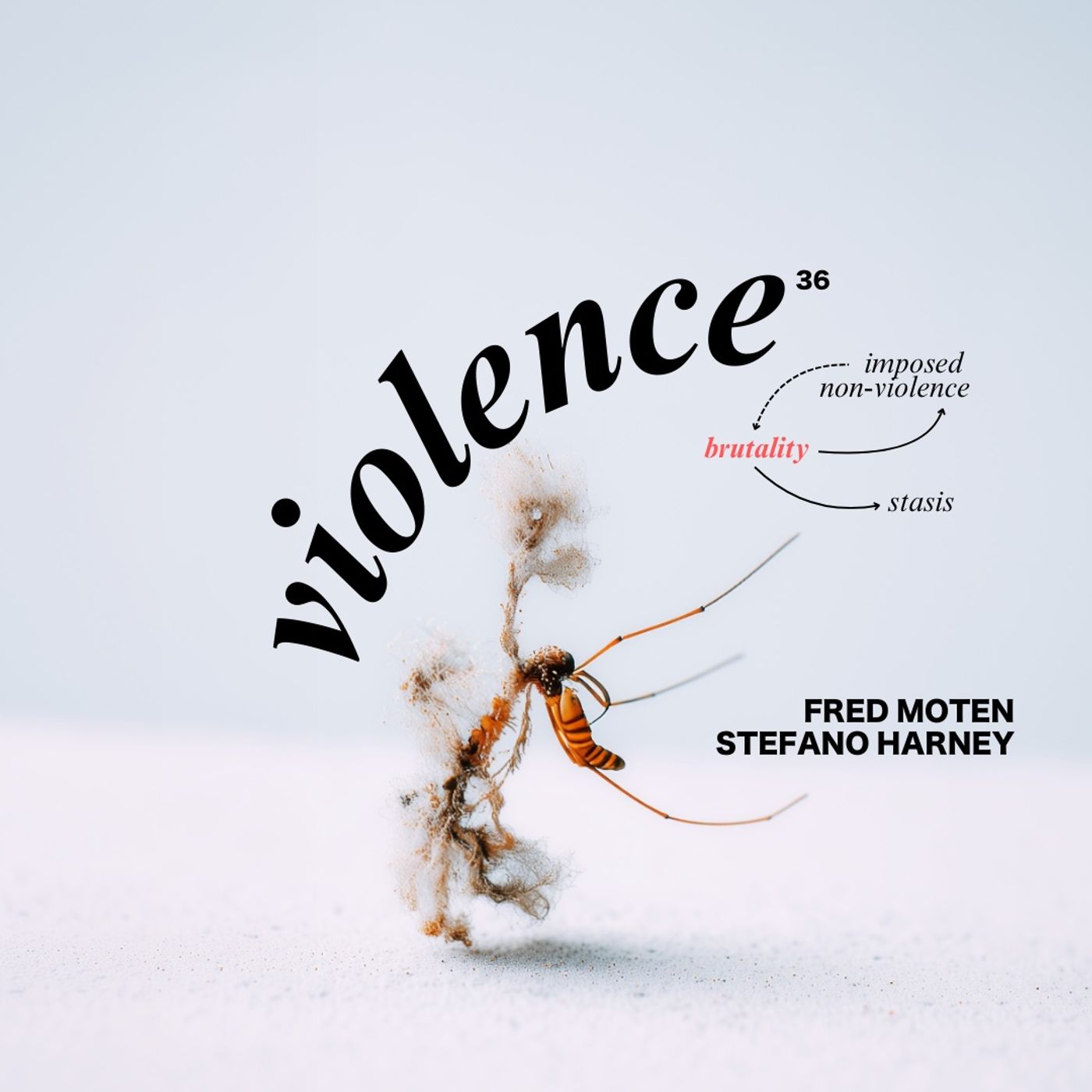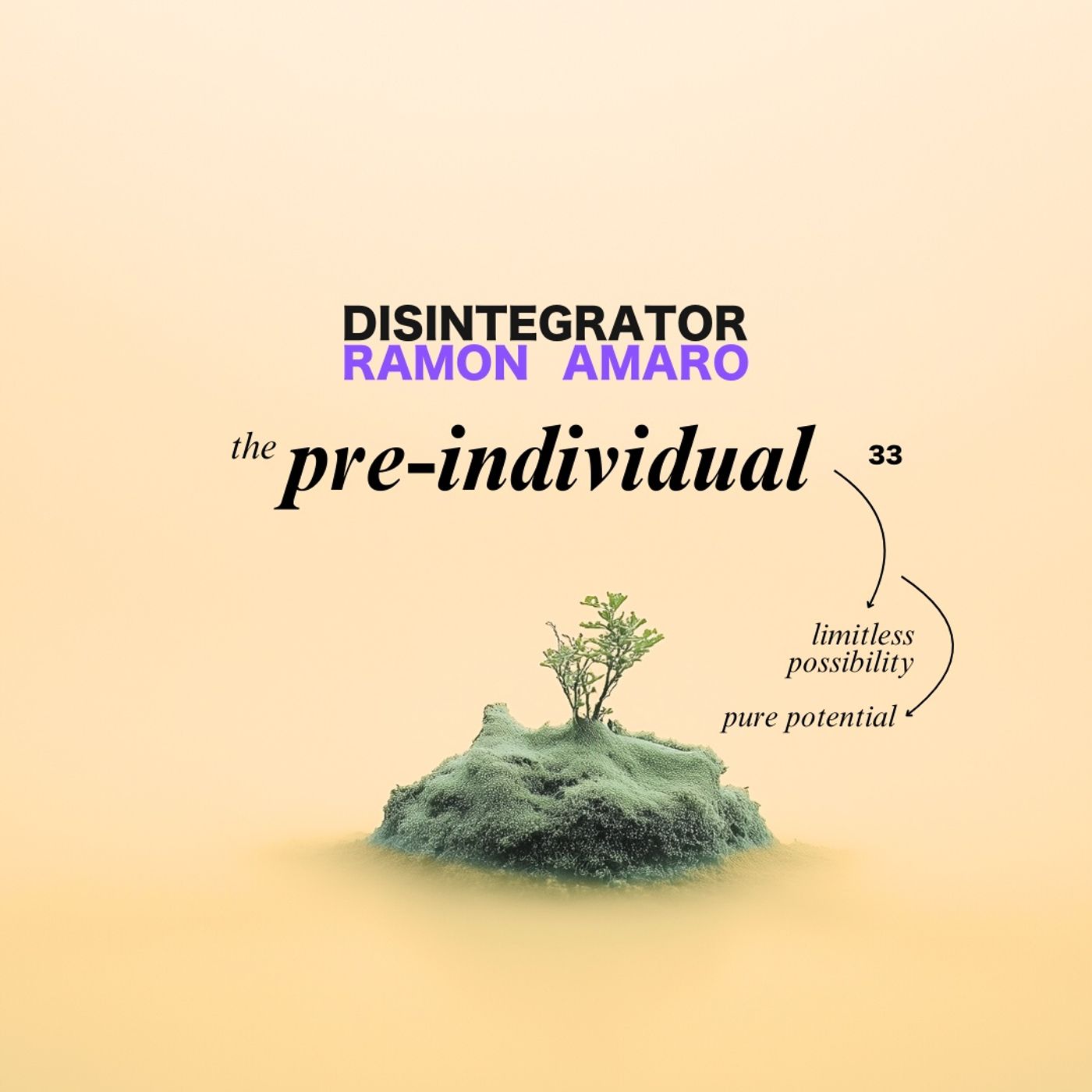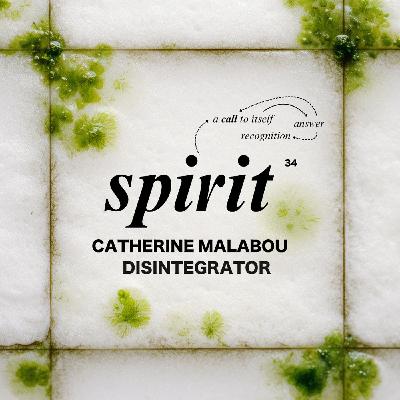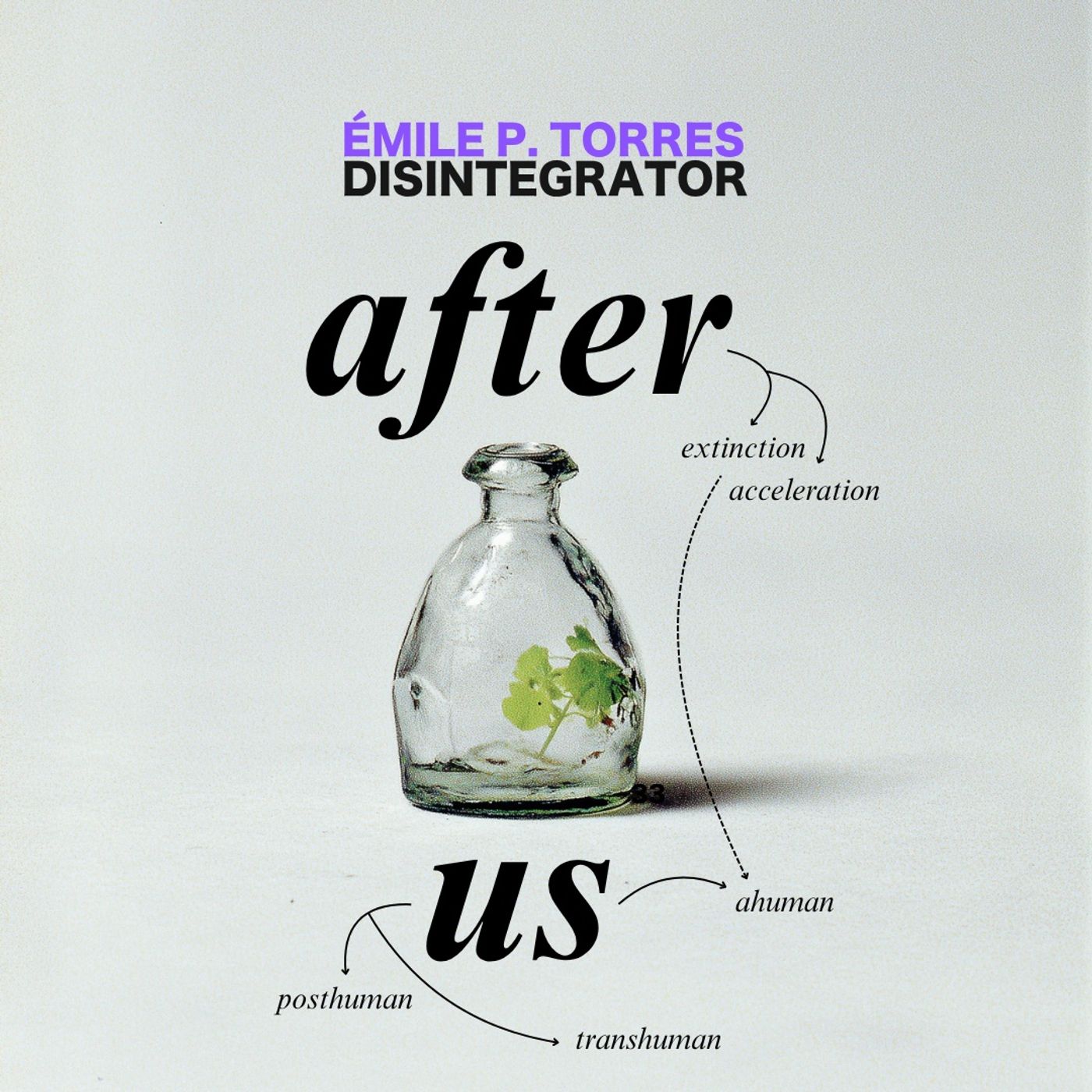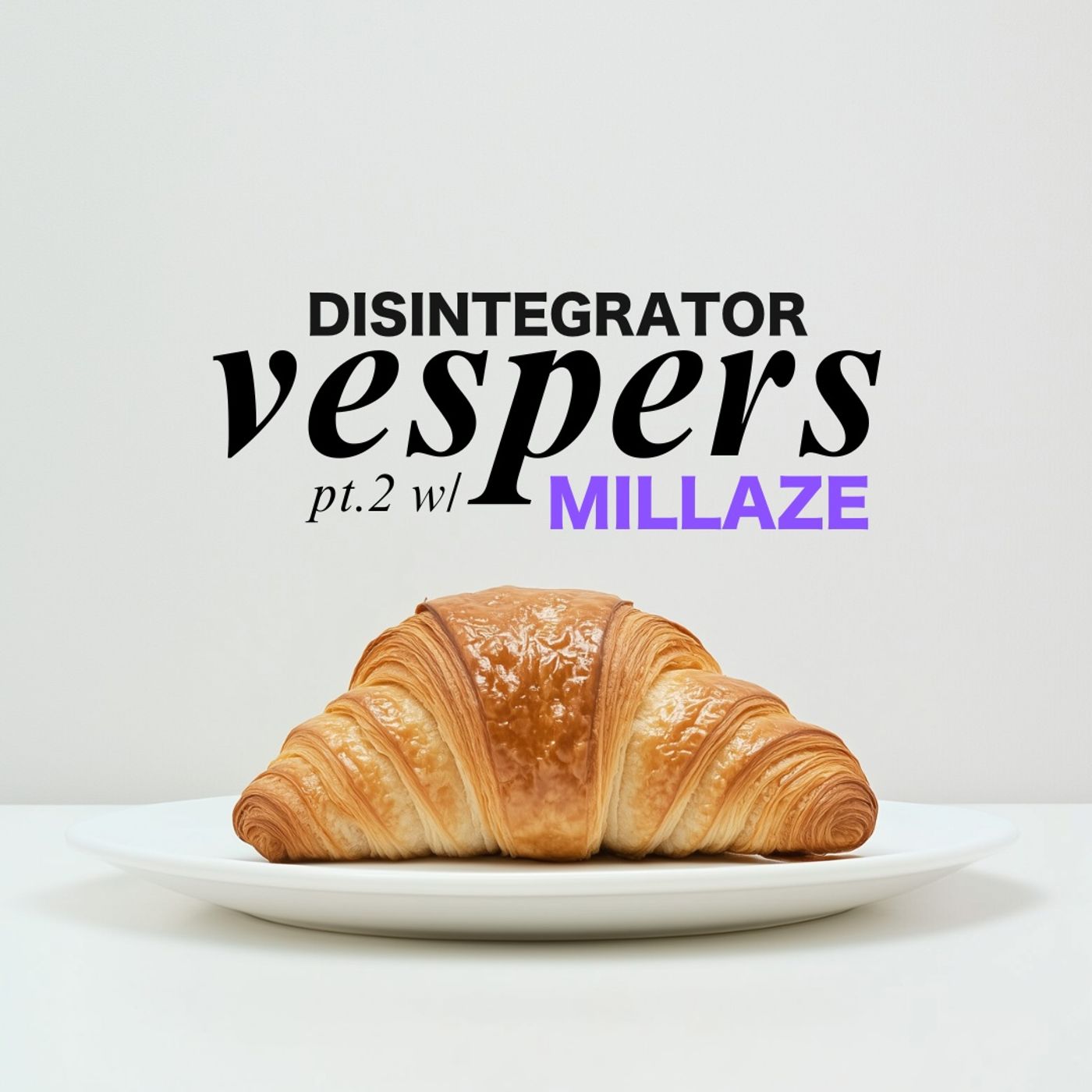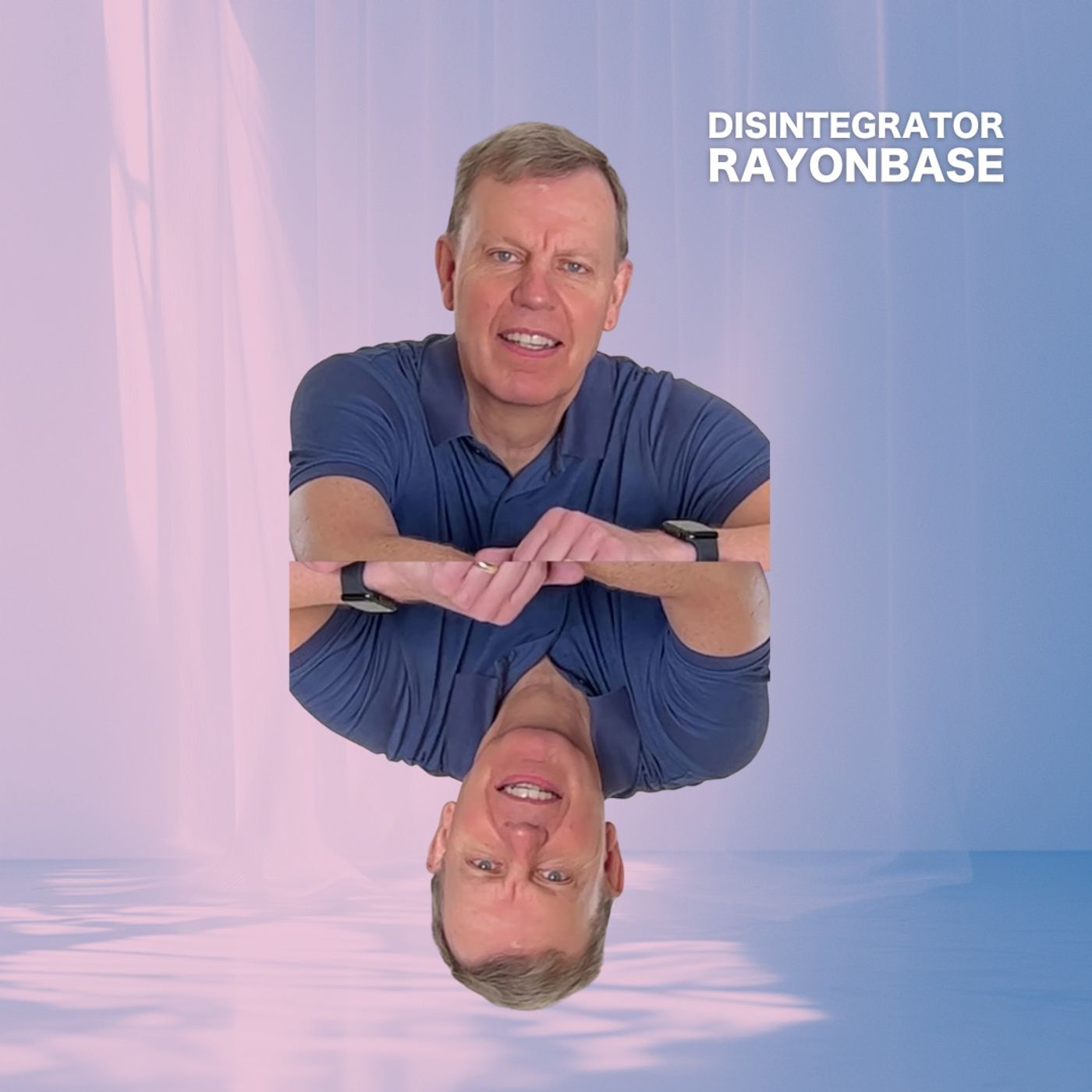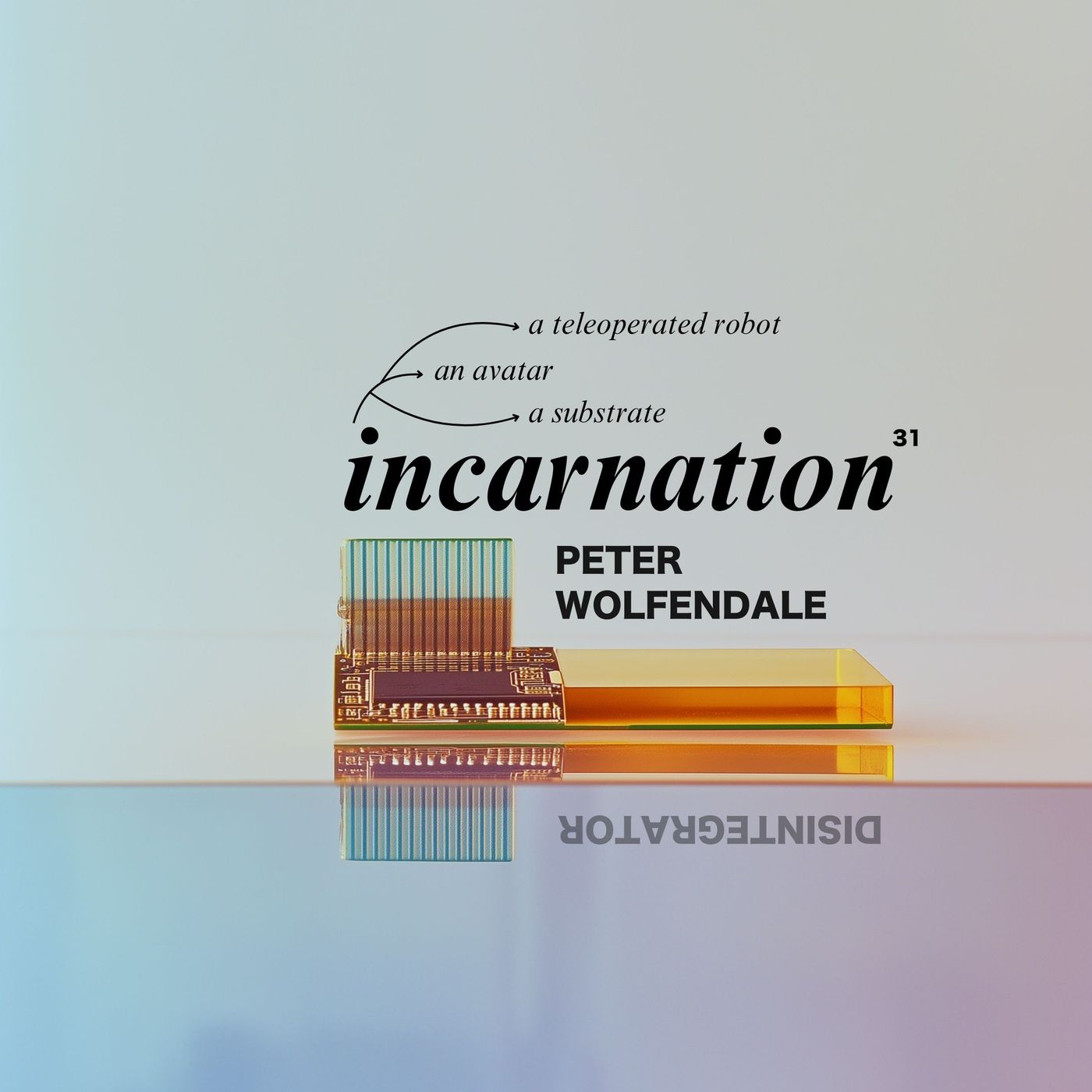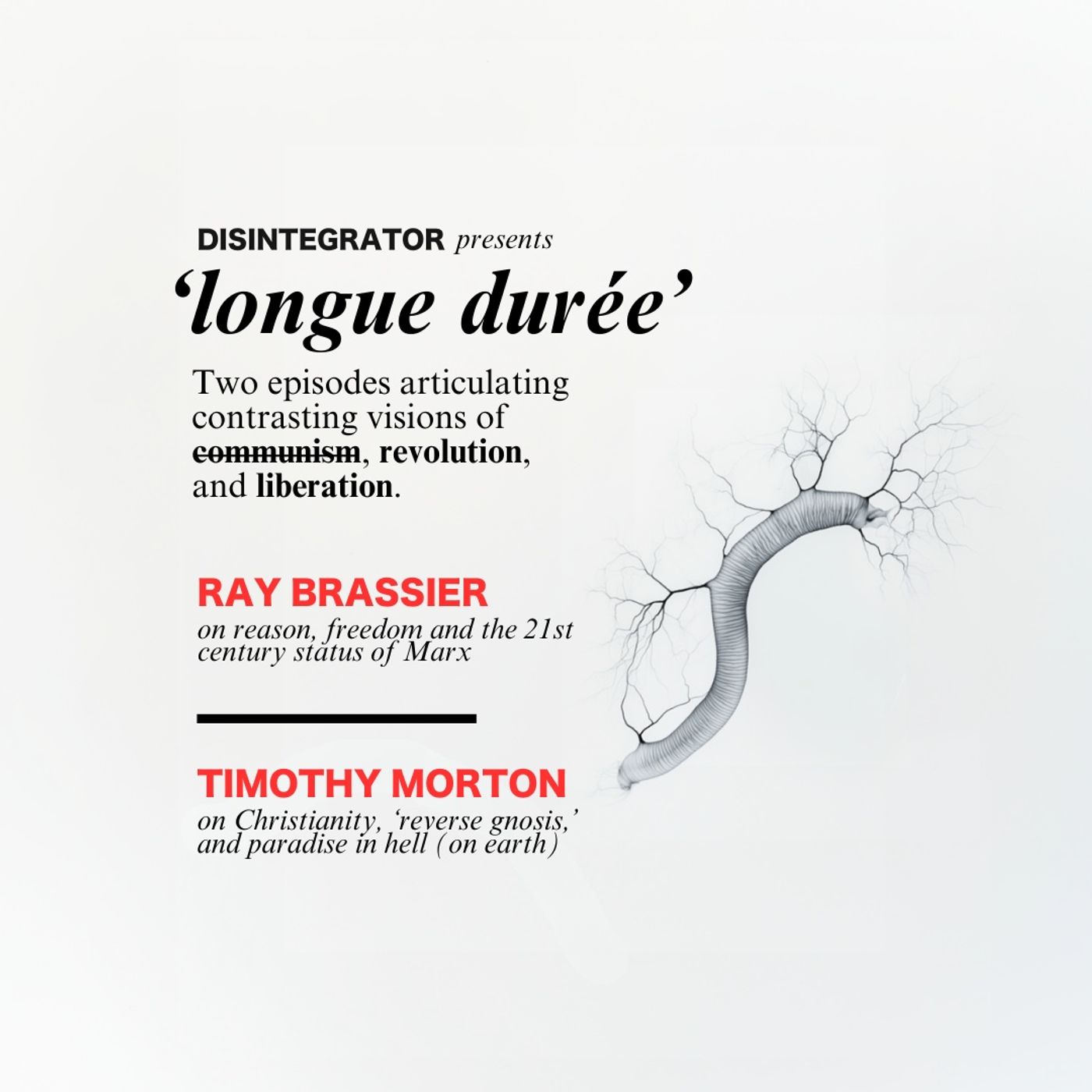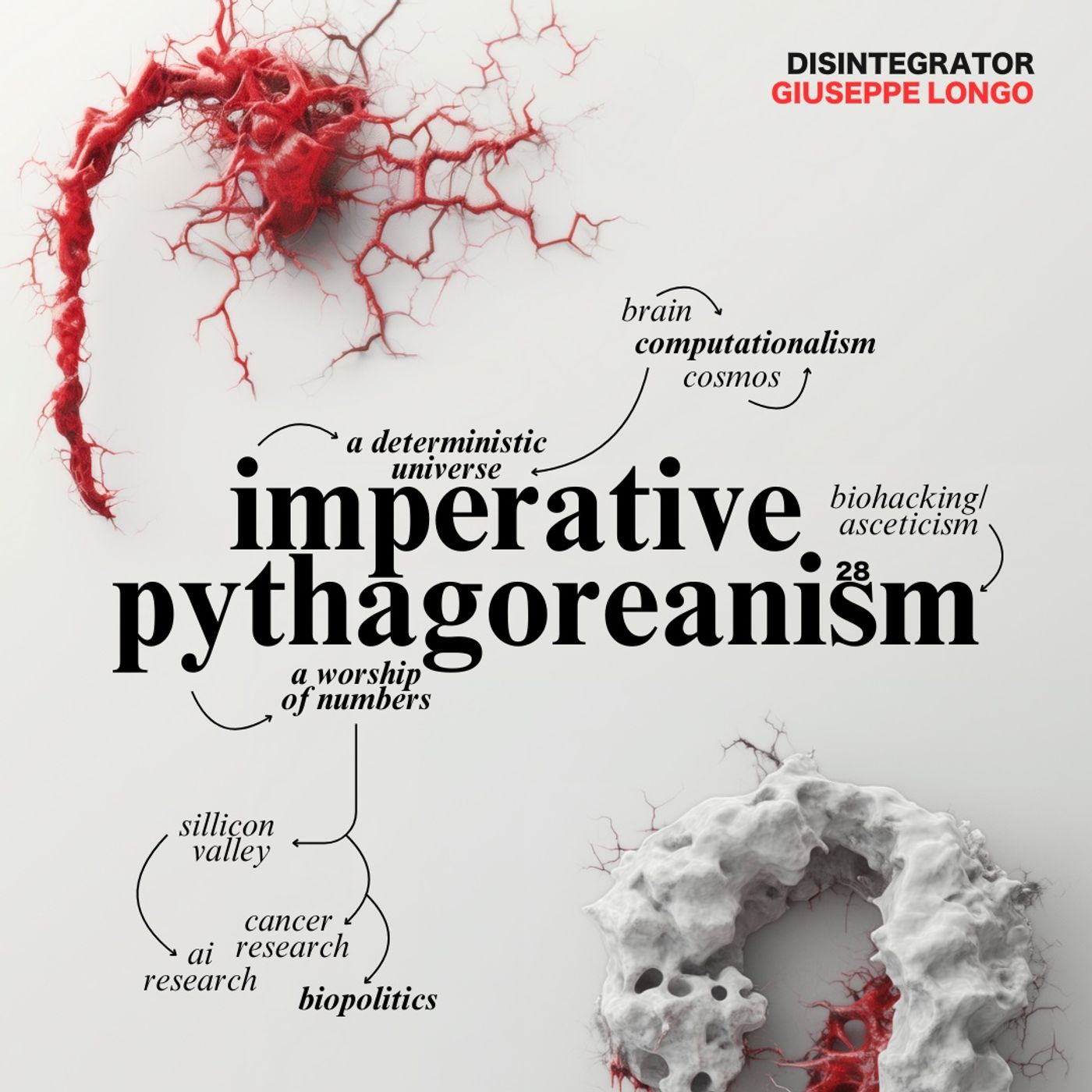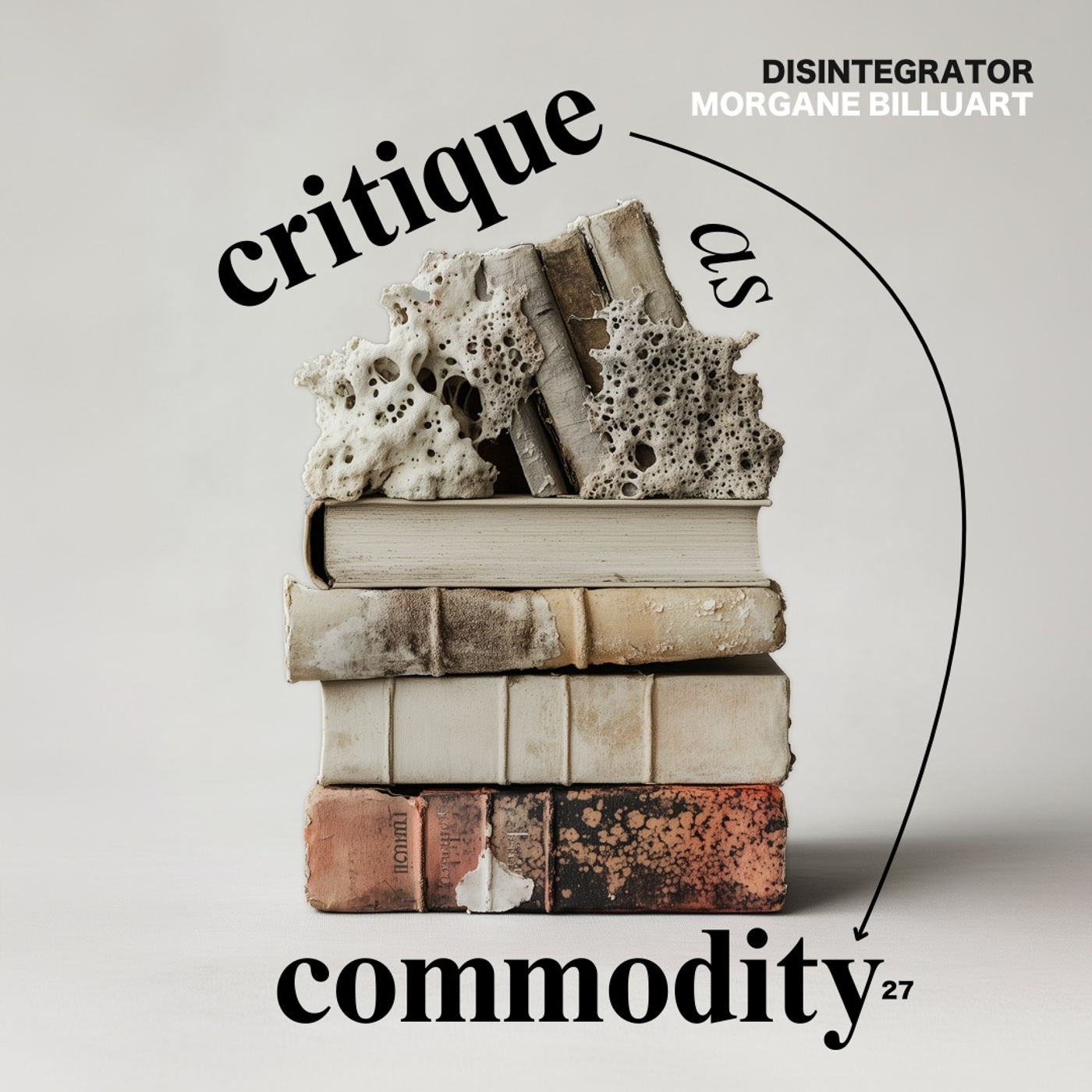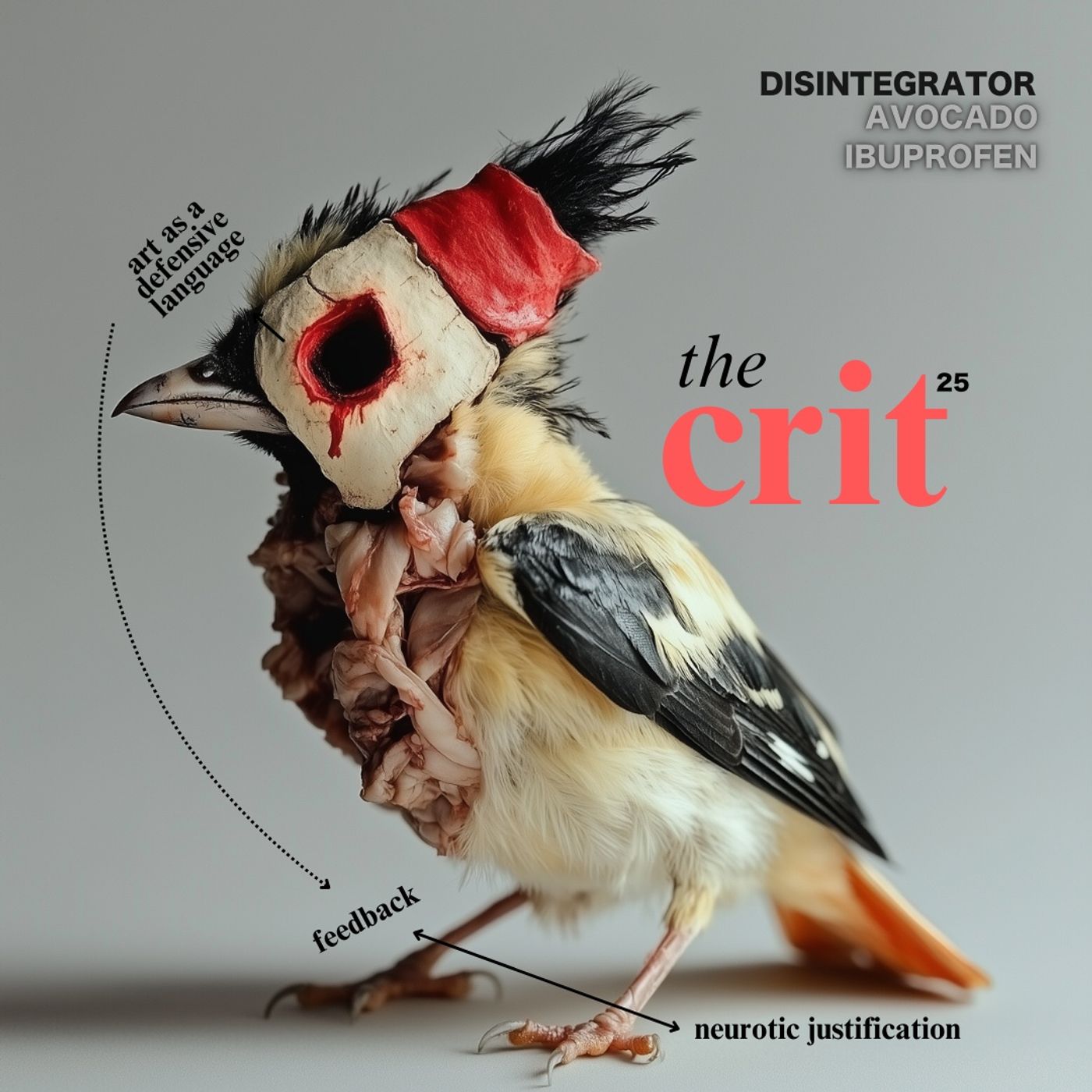Discover Disintegrator
Disintegrator

 Disintegrator
Disintegrator
Author: Roberto Alonso Trillo, Marek Poliks, and Helena McFadzean
Subscribed: 34Played: 1,052Subscribe
Share
© Copyright Marek Poliks, Roberto Alonso
Description
What does it mean to be human in an age where experience and behavior are mediated and regulated by algorithms? The Disintegrator Podcast is a limited series exploring how Artificial Intelligence affects who we are and how we express ourselves.
Join Roberto Alonso Trillo, Marek Poliks, and Helena McFadzean as they speak to the artists, philosophers, scientists, and social theorists at the forefront of human-AI relations.
Join Roberto Alonso Trillo, Marek Poliks, and Helena McFadzean as they speak to the artists, philosophers, scientists, and social theorists at the forefront of human-AI relations.
50 Episodes
Reverse
We're so so so honored to be joined by McKenzie Wark, the writer, theorist, and unmissable figure in the development of critical thought around information, class, and embodiment. Her work barely needs an introduction, but it has shaped how we think about technology, identity, and shifting relations of power, all while questioning the conventions of theory and public writing itself. Her concept of vectorialism has been extremely important to our own thinking about capitalism.This episode covers a huge range of Wark's evolving project, from her early work on the NetTime listserv and the legendary A Hacker Manifesto (2004), which mapped the shift from industrial capital to the information economy and coined the term vectoralist class, to the decisive personal turn in Reverse Cowgirl (2020), where theory stopped being about something and started being inside it. We talk about what she calls "auto-textual" writing, the body as both subject and medium, and the annihilation of subjectivity through sex, drugs, and dancing.One line from this conversation won't leave us: maybe we're entering an era defined less by an aesthetic of alienation than by an aesthetic of dissociation. If alienation belonged to industrial capitalism, dissociation might be its post-digital heir.Critical (critical) Wark:Wark, McKenzie. A Hacker Manifesto. Harvard University Press, 2004.Wark, McKenzie. Gamer Theory. Harvard University Press, 2007.Wark, McKenzie. Capital is Dead: Is This Something Worse?. Verso, 2019.Wark, McKenzie. Reverse Cowgirl. Semiotext(e), 2020.Wark, McKenzie. Raving. Duke University Press, 2023.Wark, McKenzie, and Kathy Acker. I'm Very Into You: Correspondence 1995–1996. Semiotext(e), 2015.
Two of the most important artists of the 21st century help us tease through the implications of our book.
A transmission from Becoming Press' Πάμε Βενετία! conference in Venice this past September.Contributions in order from:Palais SinclaireLucas Ferraço NassifAlessandro SbordoniEzili-i SabbahMaks ValenčičRheaDocumented by Polymnia
Welcome to the first episode of Hothouse, a limited series exploring experimental forms of demonstration, resistance, and civic imagination. Produced in collaboration with Future of Demonstration: HOTHOUSE,a renegade lab for democracy against technocapitalist authoritarianism, this series invites selected guests to expand upon their methods and perspectives. We joined the festival in Vienna this autumn through this podcast collaboration and a workshop during the Exocapitalism Euro book tour.Thanks to Gerald and Sylvia for hosting us, and to everyone who participated with such curiosity and generosity. In this episode, I speak with Sylvia Eckermann and Gerald Nestler—artists, theorists, long-time collaborators, and members of Vienna’s Technopolitics collective. Their latest chapter, HOTHOUSE, stages a festival for an overheated world, asking what forms of resistance, solidarity, and imagination can still grow when everything is already too hot. We talk about art as infrastructure rather than spectacle, about Widerständigkeit (resistance as adaptability), the fatigue of critique, and democracy as an experiment under pressure. Our conversation unfolds along the festival’s framing: post-disciplinarity, willful volatility, and the necessity of doing and thinking together, before arriving at the figure of the renegade: the one who disrupts and sabotages to make change possible.Sylvia Eckermann, a pioneer of Austrian media and game art, creates environments where participation itself becomes the question. She emphasizes the artist’s role in reanimating democratic agency and rethinking forms of participation.Gerald Nestler, an artist and former broker turned theorist, operates where finance and aesthetics converge. He coined the term derivative condition to describe speculation as the dominant mode of world-making. We discuss how big tech mirrors hedge funds, and how speculative logics structure contemporary power. Nestler reclaims the figure of the renegade—the infiltrator who learns the system’s logic to subvert it from within—and extends it to artists, activists, and whistleblowers alike.References:Eckermann, Sylvia & Nestler, Gerald. The Future of Demonstration. (2017–ongoing)
https://thefutureofdemonstration.net/.Shoshana Zuboff – The Age of Surveillance Capitalism (2019)Avanessian, Armen, and Gerald Nestler, editors. Making of Finance. Merve Verlag, 2015. https://www.merve.de/index.php/book/show/493The legendary Technopolitics Working Group in Vienna and their open work “Technopolitics Timeline”, tracing information society: https://technopolitics.info/Sylvia Eckermann: http://syl-eckermann.net/Gerald Nestler: http://www.geraldnestler.net/“Making Sense of Finance.” Finance and Society, Vol. 3, No. 2 (2017). Introduces the derivative condition: how speculation shapes reality.Nestler, Gerald. “Renegade Activism.” Technopolitics Working Papers (2020). Defines resistance as insurrection beyond critique.“Algorithmic Cognition at the Turn from Representative to Performative Power” a lecture performance with special guest, high-frequency, crypto trader and whistleblower Haim Bodek, as part of the exhibition “Hysterical Mining” at Kunsthalle Wien (2019) https://www.youtube.com/watch?v=4ekXxV7ry2AI also briefly mention T.J. Clark on political theatre and the self-awareness of the spectacle in the introduction: T.J. Clark. “A Brief Guide to Trump and the Spectacle.” London Review of Books, Vol. 47 No. 1 (2025).
We’re joined by Leif Weatherby, associate professor at NYU, founding director of the Digital Theory Lab, and author of the new Language Machines: Cultural AI and the End of Remainder Humanism, to think with us about AI, structure, and what happens when computation meets language on their own shared turf. Language Machines is easily the best book about AI written this year and is just a killer antidote to so much dreary doomer consensus, it really feels like one of the first truly constructive pieces of writing we’ve seen out of academia on this subject. This episode follows really well after two others — our talk with Catherine Malabou earlier this summer and the episode with M. Beatrice Fazi about a year ago (both faves). It feels like theory is opening back up again into simultaneously speculative and structural returns, powered in no small part by the challenges posed to conventional theories of language (from Derrida to Chomsky) by Large Language Models. This episode absolutely rips, literally required listening. Structuralism is so back (and we’re here for it). Some important references among many from the episode:Roman Jakobson, “Linguistics and Poetics.”N. Katherine Hayles, Unthought: The Power of the Cognitive Nonconscious .Beatrice Fazi, Contingent Computation: Abstraction, Experience, and Indeterminacy in Computational Aesthetics.Steven Pinker, The Language Instinct (1994).e.g. Noam Chomsky, Ian Roberts & Jeffrey Watumull, “The False Promise of ChatGPT,” NYT (link) Anthropic, “Scaling Monosemanticity: Extracting Interpretable Features from Claude 3 Sonnet” (featuring the Golden Gate Bridge example - link)LAION-5B dataset paper and post-hoc analyses noting strong Shopify/e-commerce presence in training scrapes.Weatherby in the NYT
We're joined by Mohammad Salemy, organizer and facilitator of the New Centre for Research and Practice, fierce critic, social media (@inhumansofberlin) hyperstitionist, artist, personality, and force.This episode provides a lot of background into how the New Centre came to be. If you're unfamiliar with TNC, it's one of the main places where theory happens today. Check out their website here, and some of their legendary moments on Youtube:Colin Drumm's Capital & Power - a huge influence on our book, and an excellent discussion of Shimshon Bichler and Jonathan Nitzan (heavily discussed on the pod today).Friend of the pod Richard Hames' excellent Critical Collapsology series. Laura Tripladi's series on Material Interfaces.Reza Negarestani's Draw of the Desert - one of the most incredible and contentious pieces of modern political philosophy around.While we spend time on the New Centre, we also spend time on Mo and his legendary backround, culminating in a discussion of his (iconic? infamous? lovable? hostile?) social media presence, its relationship to his political philosophy, the 'developmental problem' of post-colonial geopolitics, and on the necessity of breaking up the rust that accumulates around frozen gears. We also discuss his recent piece on &&&, Category Theory & Differential Identity, a project close to our heart in terms of understanding how identity is perhaps less constructed than it is mobilized, driven, and how it comes into contact with structures anterior to the strictly human.Many, many thanks to Mo for joining us!
We’re joined by Fred Moten and Stefano Harney — co-conspirators of The Undercommons — to think with us about AI, study, and brutality, and the long histories that place these concepts into relation. In a lot of ways neither Moten nor Harney require an introduction, they are the sources of major touchstone references made throughout this podcast — from last week’s guest Ramon Amaro to one of our first guests, Luciana Parisi, and plenty of places in between. The episode starts with a conversation about AI, but it quickly becomes a conversation about change, the question of the necessity of change or even organization, and imposition (that is, the brutal, external application of force against situations that already contain within themselves the lived possibility of alternative futures). Some important references among many from the episode: Fred Moten & Stefano Harney, The Undercommons: Fugitive Planning & Black Study (Minor Compositions, 2013).Matteo Pasquinelli, The Eye of the Master: A Social History of Artificial Intelligence (Verso, 2023).Sylvia Wynter, “Unsettling the Coloniality of Being/Power/Truth/Freedom: Towards the Human, After Man, Its Overrepresentation—An Argument” (2003).Christina Sharpe, In the Wake: On Blackness and Being (Duke UP, 2016).Denise Ferreira da Silva, Unpayable Debt (Sternberg Press, 2022).Cedric J. Robinson, Black Marxism: The Making of the Black Radical Tradition (1983; later eds. 2000/2020).Amiri Baraka, “The Changing Same (R&B and New Black Music),” in Black Music (1968).Hua Hsu, “What Happens After A.I. Destroys College Writing?” The New Yorker (June 30, 2025).• • Vannevar Bush, “As We May Think,” The Atlantic (July 1945).
We’re joined by Ramon Amaro, Creative Director of Design Academy Eindhoven — an engineer, philosopher, writer, curator, and altogether critical-force-to-be-reckoned-with on the subject of computation as it intersects with concepts like culture, race, and being. We were drawn to his tour-de-force “The Black Technical Object: On Machine Learning and the Aspiration of Black Being” (2023), which is an absolute banger, re-reading Gilbert Simondon’s technical object through the lens of blackness, race, and racialized technologies. This one is a wild ride, a really deep and incredibly thoughtful episode, and we make an effort to define some initial terms on the podcast — specifically the ‘pre-individuated milieu’ (the space where things or ideas live before they become crystalized into social or racialized relations) and the ‘technical object’ (a way that Simondon helps us think through the autonomies enjoyed by technology, that even though technological objects may be initially bound in some ways to their human partners, they are able to exert influences not just backwards on us, but influences that determine their own design evolution over time). Ramon starts the conversation with a distinction that is critical to the whole episode — that blackness is not a racial category, or moreover, that blackness is distinct from race. Race is something that happens after blackness, that impinges upon blackness as it moves from pre-individuated space and enters into the field of social relations we currently live within. This independence is critical, because it invites alternatives (and suggests, we think very rightly, that this field of social relations we currently live within, while historically situated in imperial or colonial violence, is arbitrary and exchangeable with any other possibility). A few works that are important to consider here: W.E.B Du Bois, The Souls of Black Folk — total canonSylvia Wynter’s work is discussed throughout, specifically on the concept of “Man” (particularly Unsettling the Coloniality of Being/Power/Truth/Freedom: Towards the Human, After Man, Its Overrepresentation—An Argument).Gilbert Simondon, On the Mode of Existence of Technical Objects and Two Lessons on Animal and Man — both places to look for autonomy in Simondon’s workFrantz Fanon, Black Skin, White Masks — implied by discussions of phenomenology/perception under racialization.Stefano Harney and Fred Moten, The Undercommons — no spoilers, but more on this later :)Thanks soooo much to Dr. Amaro for joining us!
We couldn't be more honored to have Catherine Malabou on the pod, a serious inspiration for all of us. This episode covers so much, moving from AI to education to anarchism to feminism, but all grounded within a focus on automony -- the autonomy of language from us, the autonomy of an anarchic subject or an anarchic collective, the autonomy of the clitoris from gender, the autonomy of the plastic being or form with respect to change.If you're unfamiliar with Malabou's work, this is actually a really great place to start. Her work includes all of the above topics, and it pushes further into language, neuroscience, and politics than most philosophers dare. We've been following her since the epic What Should We Do With Our Brains?, the legendary Plasticity at the Dusk of Writing (whose fleshing out of Malabou's reading of the plastic inspired so many theorists, arists, and researchers across endless fields and disciplines), and our personal favorite, the recent Stop Thief! Anarchism and Philosophy. We'd almost recommend working backwards from this episode (as an Anglophone, I'm thinking in terms of English translation), going into Stop Thief and Pleasure Erased: The Clitoris Unthought before taking on the works on Hegel, Derrida, and plasticity.We're so so inspired by the freshness of Catherine Malabou's perspective on AI -- as always, she dares to say and formalize things that many philosophers treat reflexively. We hope to have more conversations on the topic of AI and education soon, following from Malabou's hot takes. :)
We're back to our regularly-scheduled Disintegrator programming! We've been hard at work on our book (buy it, wtf!) but have a number of killer episodes queued up for release.Émile P. Torres is a philosopher of the end times. You'll most likely associate their name (and that of collaborator Timnit Gebru) with developing the acronym TESCREAL, a grab-bag of ideologies that undergird the romance between venture capital and Silicon Valley. We strongly recommend their podcast Dystopia Now! (w/ Kate Willett) and their newest book Human Extinction: A History of the Science and Ethics of Annihilation.The T in TESCREAL is 'transhumanism,' a frequent topic of the pod, which tends to mean an application of technology to human bodies and in such a way that allows humans to transcend human limitations (e.g. speed, efficiency, senses, mortality). From there, the rest of the ideologies follow from a relationship between the human and its 'rationalized' extensibility through technology: E (extropianism), S (singularitarianism), C (cosmism), R (rationalism), EA (effective altriusim), and L (longtermism). Here's a gentle and clean explainer of all of the above. In this episode, we talk extensively about some elements that aren't actively represented in TESCREAL but sit beneath it: accelerationism, extinction-neutrality, and left-adjacent positions with respect to both (e.g. l/acc, xenofeminism, ahumanism -- this episode might pair really nicely with our interview with Patricia MacCormack for this very reason).
CW: eating disorders are discussed a few times in this episode.Vespers is a limited series within Disintegrator that focuses on the creative feedback loops between music and social media. It follows from the Nobody Listens to Music Anymore superlecture, where themes of youth identity formation, reference-as-medium, generative AI, and the complexities of working with the total archive are discussed in more detail.For this episode, we're joined by Millaze -- an iconic face and musical voice on Instagram. We talk about love, cringe, the open-endedness of her craft (we barely scratch the surface here), and performance.Favorite Millaze-core:RamenOverrideDrivewaysBedside TableVisceraBut I really recommend her Instagram in general (as well as the fountain of Youtube Shorts)
Vespers is a limited series within Disintegrator that focuses on the creative feedback loops between music and social media. It follows from the Nobody Listens to Music Anymore superlecture, where themes of youth identity formation, reference-as-medium, generative AI, and the complexities of working with the total archive are discussed in more detail.For this episode, we're joined by RayonBase. If you've opened TikTok or Instagram over the past few years, you recognize RayonBase's face, voice, instrumental composition, and video editing style. This is an open-ended conversation about character, craft, love, innocence, and the future. <3 Favorite RayonBase-core:The Swagger Song (Badder Than You)EVER CLOSER PT. 2ShelterCan Eye Kiss You?Innocence Found^ The above are videos / shorts primarily used as teasers for full songs, all of which is available on any streaming platform.
Artist and curator Dana Dawud joins Disintegrator to talk about Open Secret, her touring platform for internet cinema, and her evolving film series Monad. We discuss the blur as a visual device and trend, the impossibility of representing Palestine, being trained by AI and building myth in the age of the feed. The audio is laced with reflections by collaborators orbiting Open Secret: redactedcut @redactedcut, Palais Sinclaire @palais.sinclaire, Mischa Dols @mischaapje, 0nty @the.ontological.turnt, Angel Kether @user_goes_to_kether. References mentioned:Gore Layer by Alex Quicho in Spike (July 2024): https://www.spikeartmagazine.com/articles/discourse-the-gore-layer-alex-quicho,The novel Aliens & Anorexia by Chris Kraus: https://www.semiotexte.com/aliens-anorexia-new-edition,Further reading on CoreCore by 0nty (July 2023): https://becoming.press/corecore-the-return-of-speculative-irony-by-0nty,We spoke about Serge Daney’s observation that “there is no image of Palestine” (or, more precisely, that there is “no complex image of Palestinian reality”) which arises from his deep engagement with the politics and ethics of representation, particularly in the context of Jean-Luc Godard’s film ‘Ici et ailleurs’ (Here and Elsewhere). Read more in Serge Daney’s seminal ‘Before and After the Image’ (1999): https://www.jstor.org/stable/41389528.,Watch ‘The Sight is a Wound’ (2025), a visual essay by Parham Ghalamdar: https://www.ghalamdar.com/tsiaw,‘The Fold: Leibniz and the Baroque’ (1988). In this work, Deleuze interprets monads not as isolated points but as folds of space, movement, and time, each containing the world within itself as a unique point of view.,Jaques Rivette’s almost-13hr-long-film: ‘Out 1’ (1971),Sven Loven at No Gallery: https://www.nononogallery.com/exhibitions/sven-loven-humiliation-ritual/#press-release,Links to explore Dana’s work:Monad+ : https://hybrida.space/monad,PalCoreCore: https://donotresearch.substack.com/p/dana-dawud-palcorecore,Pleasure Helmet Podcast: https://soundcloud.com/pleasure-helmet-977951874,https://www.instagram.com/dansdansrev/,https://www.instagram.com/_opensecrett_/
We’re joined by philosopher Peter Wolfendale — a singular voice in contemporary theory, known for his work on autonomy and the metaphysics of cognition. In this episode, we dive deep into the philosophical problems behind artificial general intelligence, not from the angle of safety or speed, but from the standpoint of what it means to think, to revise, and to reproduce. Peter’s blog and twitter account are legendary (@deontologistics) — more Peter here:The Laruelle Thread‘Artificial Bodies and the Promise of Abstraction’An excellent thread on Bayesian Solomonoff on his blog ‘The Reformatting of Homo sapiens’The Pete Wolfendale Nick Land DebateAn excellent interview with Peter on GradientPage for Wolfendale’s new, yet unreleased book The Revenge of ReasonSUPPORT THE POD :) -- preorder our new book!
CW: There is some brief discussion of abusive familial relationships at several points within this episode.Two titanic figures in contemporary theory join us for two separate and strongly divergent episodes on the status of revolutionary thought in political philosophy today.Timothy Morton is one of the most outspoken and controversial voices in the discourse, someone whose impact punched hard into the artworld, defining a decade of new ecological and object-oriented aesthetics. For almost the entire 2010s and much of the 2020s it was hard to read a single exhibition text without recognizing Morton’s impact.Timothy joins us for an expansive conversation that moves through Buddhism, Christianity, communism, trauma, poetry, and the question of whether “love your neighbor as yourself” might actually be a planetary-scale software instruction. Morton describes communism and Christianity as radically entangled modes of relation, both grounded in care and unknowing.We strongly recommend:Most people should already be familiar with Morton's most iconic concept and contribution: HyperobjectsTimothy’s book Ecology Without Nature Their more recent Hell: In Search of a Christian Ecology And we spend a lot of time talking about SpacecraftIn the episode, we also touch on the work of Fredric Jameson, Terry Eagleton, Thomas Merton, Raymond Williams, and Simone Weil.
Two titanic figures in contemporary theory join us for two separate and strongly divergent episodes on the status of revolutionary thought in political philosophy today. Ray Brassier influenced a generation of philosophers not only with his outstanding and highly rigorous writing, but also his absolutely stunning translations of Quentin Meillassoux and François Laruelle, and in so doing is subcutaneously responsible for literally a decade of earthquakes in the discourse. Ray joins us to evaluate the status of Marx in the 21st century.Ray traces the long arc from Nihil Unbound through Marx, Sellars, and the inferentialist tradition, opening up an unapologetically rationalist framework for understanding both science and emancipation, without reducing either to liberal platitudes or metaphysical fantasies. We discuss the seductive dangers of naive anti-humanism, the legacy of German idealism, the automation of reason, and why political theory today needs to be deeply embedded in materialist accounts of scale, finance, and abstraction. Ray shares a trenchant critique of both the empiricist and idealist strands of Enlightenment thought, offering instead a dialectical, normatively grounded, socially embedded concept of rationality that returns to Kant and Hegel by way of Wilfrid Sellars. We strongly recommend:Ray’s book Nihil Unbound: Enlightenment and Extinction His essay “The View from Nowhere”His exceptional piece "Politics of the Rift" on Théorie Communiste in e-fluxWork from the journal Endnotes (https://endnotes.org.uk/)In the episode, we also discuss theorists such as Badiou, Larouelle, Meillassoux, and Marxist reinterpretations by Moishe Postone, Théorie Communiste, and the German “New Reading” school. Ray elaborates on how capital’s increasing abstraction—especially in financialized regimes where labor is decoupled from value—is not the end of Marx, but a reason to read Marx more seriously and materially than ever.
It’s such an honor to welcome Giuseppe Longo to the pod! Professor Giuseppe Longo is the Research Director Emeritus at Centre National de la Recherche Scientifique at the École Normale Supérieure in Paris. His work spans mathematics, computer science, biology, especially through the connective theoretical tissue of epistemology. Our conversation orbits around the limitations (or specific capacities) of computation, especially as computation becomes more and more central to mainstream theories of thought, being, life, and even physics. Longo pushes back on computationalism, grounding his critique in the sciences and in mathematics, especially as it becomes more and more established as an ideological foundation underneath applied biological research. No, for Longo the body is not a computer, the brain is not a computer, the world is not a computer, and the universe is not a computer — a computer is something altogether very specific, and should be afforded the dignity of its specificity. The title of this episode (imperative pythagoreanism) refers to pythagoreanism (the ancient worship of numbers in the 6th-4th century cult of Pythagorus, specifically the idea that the universe is fundamentally made of and reducible to numbers) and the imperative mode of computation (a determinative command structure).
We’re on with Morgane Billuart, a writer and artist and a researcher whose work engages critically with technologically mediated and determined worlds — not least within her exceptional book “Cycles, the Sacred and the Doomed: Inquiries in Female Health Technologies.” Morgane joins us to talk about a large, recent research project on a particular character that many of us identifies with, what Geert Lovink calls the “critical internet researcher” — a figure who engages in a kind of postdisciplinary media theory while at the same time producing and publishing their work through the very media they are studying, the Online. We strongly recommend:Morgane’s podcasts Becoming the Product and Girl Employee with Carmen HinesMorgane’s substack Becoming the ProductMorgane’s book Cycles, the Sacred and the Doomed: Inquiries in Female Health Technologies on Set MarginsIn the episode we discuss the work of Geert Lovink and the Institute of Network Cultures and Joshua Citarella (and the associated entity Do Not Research), and we briefly touch on Yancy Strickler (and the associated MetaLabel), Trust, the New Center for Research and Practice, Are.na, New Models, and RADAR (https://www.radardao.xyz/). All are mentioned in the context of being institutions undertaking the extremely admirable charge of iterating upon new vehicles and structures for the exchange of information. Marek also briefly mentions the blogger RM (@NilsEdison) and the artist Maria Tsylke.
Gordon White is a chaos magician, shamanic practitioner, and permaculture designer based in Tasmania. He podcasts and teaches through the vehicle of Rune Soup, the world's largest magic academy, and he writes prolifically -- not only on the Rune Soup blog but in several incredible books. Gordon's breadth and depth of knowledge is unbelievably humbling, and it was an honor to spend an hour or so with him.We came to Gordon for perspective, to some bring context and breadth and dimension to our relatively narrow world. Disintegrator sits in a kind of para-academic space, where we tend to limit the things we allow ourselves to write and think in terms of what's acceptable in mainstream academia. And there are so many people in this space, squashed between the outer walls of the academy and a totally vast, teeming ocean of different ways of thinking and being.((An academic might chastize us for using 'outside' as a kind of euphemism for an alien or an other, but we'd push back -- it is the inside that we're all kind of bunched up against, like feudal serfs huddling for protection and warmth. As we look outside, we've started to speculate about what might be out there, inventing our own 'pseudosacreds' that preoccupy our minds without forcing us to change anything about ourselves.))Gordon brings sledgehammers from magical practices and shamanic tradtions around the world, alongside a potent alternative canon of Western, and, well, pummels our walls a bit.Tons of references packed in here, but a good place to start would be his books Chaos Protocols and Ani.Mystic (in order). Marek fell in love with Gordon's world through these three podcast episodes (one, two, three) and this lecture at the Guggenheim (with visual media from friend of the pod Refik Anadol).Further references:A big and loving shoutout to Jay Springett, who just absolutely rules in every possible way, you gotta be a JayMo fan fr.Gordon references Dr. Jeff Kripal on the subject of the 'imaginal' -- which becomes a helpful concept later in the episode as we talk through technology. The imaginal is an ontological layer or that is not necessarily physical but still real.The most significant reference here is of Eduardo Viveiros de Castro, a Brazillian anthropologist discussed in the context of pespectivism and what a truly decolonized anthropology (and philosophy) might look like.Gordon references Ephesisans 6:12 ("powers and principalities") in the context of a Christian ontology that affords an idea the status of a being.Dr. Jack Hunter's concept of "ontological flooding" -- an "opening of the floodgates" of what is discussible in ontological terms. Here's a discussion on the subject from 2021.Marek references a recent trend in philosophy ("object oriented ontology") that grapples with the autonomy of the non-human world. This episode is cheekily named after Quentin Meillassoux's concept of the "great outdoors" -- a plane of reality that exceeds human experience or human conception.Gordon references Paracelsus, Edgar Cayce, Rudolf Steiner, and Allan Kardec in the context of a Western spiritualist canon.Gordon discusses Matías De Stefano specifically in the context of mineral intelligence. Here's an absolutely wild talk on the subject.For those unfamiliar, the "Dieta" that Gordon refers to is a period of isolation, strict diet, and deep work with plant medicines like ayahuasca.Ambient track is 'Respect for the Medium' by friend of the pod They Became What They Beheld, show them some love on Bandcamp.
You already follow @avocado_ibuprofen. His memes IV-ed into the arm of the artworld, circulating through the DMs; they are acidic and thereaputic, they throw up solidarity through critique and gentle negation. We talk about art education, disappointment, exhaustion, glamour, and a beautiful idea (automating the viewer) he began to expand upon in an interview with Valentinas Klimašauskas here.Buy his mugs. Memes we discuss:(Selling Mugs Galaxy Brain)(Phone/Pocket/Lineage)(AI Meme 1, AI Meme 2)Ambient track is 'Respect for the Medium' by friend of the pod They Became What They Beheld, show them some love on Bandcamp.


